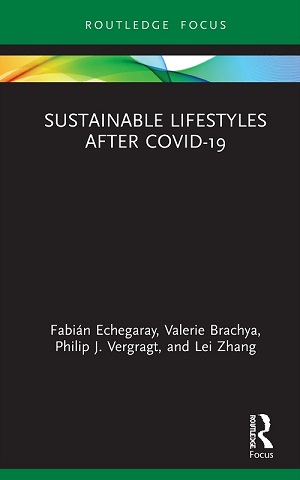张磊等: sustainable lifestyles after covid-19
发布时间:2021-04-01
内容简介:
this book takes an in-depth look at covid-19-generated societal trends and develops scenarios for possible future directions of urban lifestyles.
drawing on examples from brazil, china, and israel, and with a particular focus on cities, this book explores the short and long-term changes in individual consumers and citizen behavior as a result of the covid-19 pandemic. on the basis of extensive market and opinion research data, aggregate data, observational evidence, and news reports, the authors provide a detailed account of the transformations that have occurred as a result of a triple shock of public health emergency, economic shutdown, and social isolation. they also examine which of these behavioral changes are likely to become permanent and consider whether this may ultimately promote or restrain sustainable lifestyle choices.
innovative and timely, this book will be of great interest to students, scholars, and professionals researching and working in the areas of sustainable consumption, urban and land use planning, and public health.
专著封面照片:

目录:
preface
chapter 1: introduction: how covid-19 reshaped lifestyles across societies
chapter 2: post-covid-19 trends: acceleration, deceleration, and innovation
chapter 3: new normal lifestyles: future scenarios
chapter 4: how covid-19 may redefine the home
chapter 5: post covid-19 lifestyles around the community in china
chapter 6: how covid-19 may reshape cities
chapter 7: will covid open the door to more sustainable consumption and lifestyles?
chapter 8: policy response to covid-19: green recovery or a different pathway?
chapter 9: conclusions
样章试读:
preface (前言)
the idea of writing a book emerged within the context of the scorai (sustainable consumption research and action initiative; www.scorai.net) network, which brings together researchers and practitioners from a wide range of disciplines to exchange knowledge and views concerning sustainable consumption and to influence activists and policy makers.
the network is largely dominated by participants from north america and europe, but has attracted over the years small groups from brazil, israel and china as well as individuals from other countries and continents. philip vergragt of boston, one of the founders of scorai, invited leading representatives of the international groups to meet online and exchange ideas. little did he imagine that this group would not only present papers at the fourth scorai bi-annual conference in june 2020 but continue together through the summer and autumn months of covid 19 to write a book.
fabian echegaray from brazil initiated writing a book together and it turned into a fascinating and intellectually stimulating experience. as we talked together on zoom, we realized that despite the huge differences in political regimes, economic structures and social organization, we actually found very similar behavioral responses. lei zhang from china was the first to present what appeared to be long term societal transformations when she remarked 'everything has gone online'. valerie brachya of israel realized soon afterwards that that was exactly what was happening around her.
the authors put their experiences together in writing this book but each chapter was the responsibility of the lead author. the chapters are integrated into a common coherent framework, but each is written from the lead author's viewpoint and presents some details of their own country experience.
the book was written during the summer and fall of 2020 when the pandemic was by no means over and actually resurging. the worldwide hope was that by mid-2021 a vaccine would enable the world to overcome the worst health effects; but it was clear that the economic and cultural effects would be much more long lasting. the authors based their chapters on the limited availability of data at that time and therefore their assertions are made with a high level of uncertainty. no doubt with multiple research and hard evidence it will be possible to provide a firm basis for such or other assertions in the future – but that will be too late for policy makers. the authors therefore conclude by presenting diverse directions of strategy and policy which they hope will stimulate an ongoing dialogue.
the authors wish to thank halina brown for reading the entire earlier version of this manuscript and for suggesting valuable suggestions and data that greatly improved the final version of this book.
原文链接: